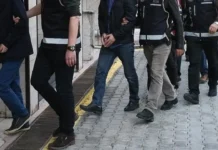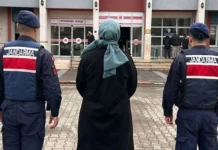Human rights activists are gathering in European cities to protest Ankara’s alleged sanctioning of enforced disappearances and to stand in solidarity with educator Orhan İnandı, who is feared to have been abducted by Turkish intelligence in Kyrgyzstan.
In addition to a protest on Thursday at the Turkish Embassy in London, human rights activists protested on Friday outside Ankara’s diplomatic mission in Berlin, condemning İnandı’s suspicious disappearance in Bishkek.
According to Turkish Minute, dozens of people also gathered yesterday in the Place du Luxembourg in Brussels to call on European authorities to help find İnandı.
A statement read out by one of the protestors in Brussels said İnandı’s case recalls the case of Saudi journalist and dissident Jamal Khashoggi, who went to the Saudi Consulate General in İstanbul in October 2018 and was brutally murdered by Saudi operatives.
İnandı, the founder and president of the Turkish-Kyrgyz Sapat school network operating in Kyrgyzstan, went missing in Bishkek on the evening of May 31 and is feared to have been abducted by Turkey’s National Intelligence Organization due to his alleged links to the Gülen movement.
İnandı’s car was found early on June 1 with doors open and valuables intact, suggesting this was not a case of robbery. Kyrgyz police started an investigation into İnandı’s disappearance on the same day, followed by an instruction from President Sadyr Japarov to the State Committee on National Security and the Interior Ministry to intensify the ongoing searches.
İnandı’s wife, Reyhan İnandı, said in a June 6 statement that an undisclosed source told her that her husband was being held against his will at the Turkish Embassy, and she claimed he was being tortured to renounce his Kyrgyz citizenship. This would simplify İnandı’s forcible transfer to Turkey, she said.
Taalaygul Toktakunova, the attorney for the İnandı family, on Wednesday shared records from a dashcam from İnandı’s car showing suspicious individuals who could have been involved in his disappearance, which occurred right after a meeting with a former minister who took a trip outside Kyrgyzstan soon after İnandı went missing.
Locals have been protesting since the suspicious disappearance of İnandı in the hope of finding him. The protests mostly take place in front of the Turkish Embassy, where İnandı is believed to be held, and the parliament and presidential buildings in Bishkek.
Turkish intelligence has intensified its efforts to target dissidents abroad. Most recently a nephew living in Kenya of Islamic scholar Fethullah Gülen was abducted by Turkish spies and brought back to Turkey at the weekend, according to the state-run Anadolu news agency.
In a joint letter UN rapporteurs accused the Turkish government of engaging in the systematic practice of state-sponsored extraterritorial abductions and forcible returns to Turkey, with at least 100 Turkish nationals from multiple states including Afghanistan, Albania, Azerbaijan, Afghanistan, Cambodia, Gabon, Kosovo, Kazakhstan, Lebanon and Pakistan removed to Turkey.
In a number of cases the UN Working Group on Arbitrary Detention (WGAD) concluded that the arrest, detention and forced transfer to Turkey of Turkish nationals were arbitrary and in violation of international human rights norms and standards.
A recent report by Freedom House on global transnational repression also revealed the intensity, geographic reach and suddenness of the Turkish government’s campaign targeting dissidents abroad, noting that Turkey has become number one among countries that have conducted renditions from host states since 2014.
According to the report, Ankara’s campaign has primarily targeted people affiliated with the Gülen movement, but the government has started applying the same tactics to Kurdish and leftist individuals living abroad.
The Freedom House report also indicated that the Turkish government has pursued its perceived enemies in at least 30 host countries spread across the Americas, Europe, the Middle East, Africa and Asia since a 2016 coup attempt.
















